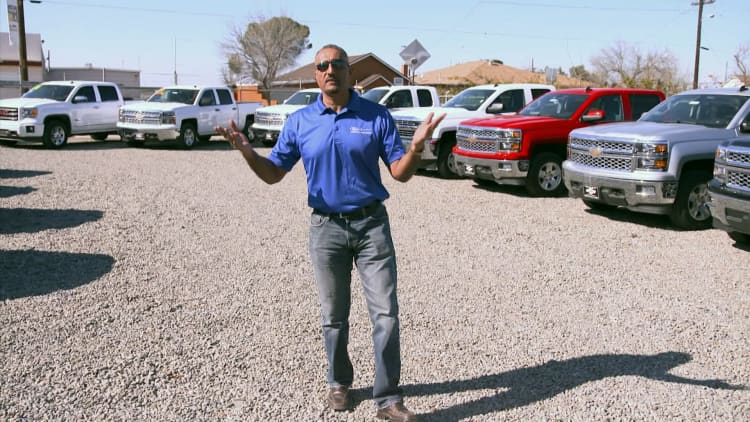Christy Webber started off with a mower, weed whip, leaf blower and a truck. Now, as the president of Christy Webber Landscapes, one of the biggest landscaping operations in Chicago, she has $6 million worth of equipment, $20 million in payroll and employs over 400 people.
Webber first started mowing lawns, she tells CNBC Make It, shortly after she moved to the Windy City in 1983, while trying to figure out what to do with her life. She was working in retail at the time with a degree in physical education from the University of Denver and wanted to make a couple extra bucks on the side.
So she took a loan from her mother and invested in the few pieces of equipment she needed and started doing small landscaping jobs at people's homes. Slowly, she built up her client base and began hiring people to work for her.
As Webber's business grew, she knew it was way more than a summer gig. So she began to think of ways to beat the competition.
"When businesses focus on one thing, they go under," she says on CNBC's "Blue Collar Millionaires." It was a common weakness of her competitors, so she made it a point to not just mow lawns, but also to weed and mulch, and then she began doing more specialized tasks, such as installing gardens and green roofs and irrigation systems.
"I feel like the more diverse we are, the bigger and stronger we are," she says.
Webber learned all she could about the industry, in part by taking advantage of the fact that her mostly male competitors didn't take her seriously as a woman landscaper.
At meetings for the Illinois Landscape Contract Association, for example, men would ask her, "Honey, what are you doing at this meeting?" Or they would "mansplain" about the business. Usually, she knew well more than they assumed, but she also took the opportunity to ask questions like, "And how many yards of soil would I need for a job like that?"
The men often boasted about scamming clients, too. "Typically, in residential, you're dealing with wives," she tells CNBC Make It. One man told her that when he installed rocks in women's yards, he'd overcharge them and have them pay for two tons, though he'd only use one.
"These chicks don't know," he told Webber, who affirms that the shortsighted misogyny was ultimately bad for his business in the long run.
Webber pushed aside the sexism and bad advice on how to cheat clients. She wasn't condescending, didn't overcharge and didn't treat female clients differently from males. She gradually made a name for herself as a landscaper in Chicago, and as her company grew, those competitors were surprised by her success, she says.
By the late '90s, Webber was doing mostly commercial work. Her company won a bid in 1998 to maintain the United Center sports arena, home to the NBA's Chicago Bulls and the NHL's Blackhawks. At the time, it was her biggest contract.
In 2004, when Millennium Park, one of Chicago's biggest, was built, she handled the design and installation of all the trees, shrubs, grass and irrigation systems. "It was the one that put me on the map," she says. But because she was still new to the industry, the project didn't make her much money at all.
"The dollars and cents are so immense. You can't just be thrown out on these jobs ... because you'll just fail," she says. "You've got to understand how to manage a project like that. You've got to have the right people in place. You've got to understand how to buy right, how to handle it right, how to bill it."
At that point, she didn't. "We weren't ready for it. If you look at the trajectory of my company, I'm growing, growing and making money and then all of a sudden, here comes the Millennium Park job, and then, 'Bam!'" she says. "Those were the years where we were almost close to going under."
The bid was too low, and it was hardly enough to cover the prevailing wages of her workers.
Since then, she's figured it out. "It's just knowing the industry," she says.
In 2015, Christy Webber Landscapes installed over 250,000 trees, shrubs, perennials, bulbs and grasses on The 606, a train line-turned-green space in the Logan Square neighborhood of Chicago. It was a $4 million job, and it turned a much better profit than the Millennium Park installation.
Now, she says, pretty much all the jobs she does are contracted for at least $1 million, and she shoots for profit margins between 25 and 38 percent.
She also does a lot of work for free. She's helped make Chicago greener by supporting "guerrilla gardening" (turning vacant or abandoned lots into green spaces) and funding nonprofits such as NeighborSpace, which sustains community gardens. She also donated over $100,000 of plant material and labor for a project to renovate the roof of the LGBT Center on Halsted.
Speaking on what it took to turn her summer job into this multimillion-dollar business, Webber tells CNBC Make It that it's really all about fully investing yourself.
"Don't think you're going to work a little side hustle and turn it into a legitimate business by not giving it your all. I still give it my all," she says. "You're going to have to work hard. There's nothing free. Nothing comes to you free. You know, if it's easy, everybody would do it."
– Video by Luqman Adeniyi
Don't miss: How one man turned his college side hustle flipping cars into a $250 million-a-year automotive empire

Like this story? Like CNBC Make It on Facebook!



